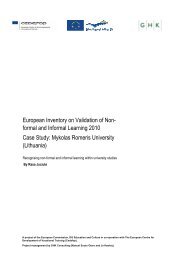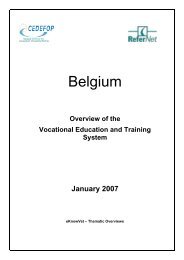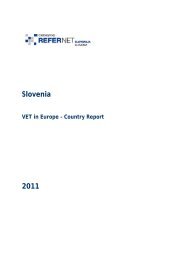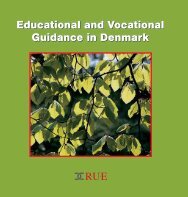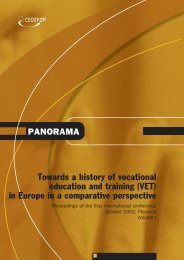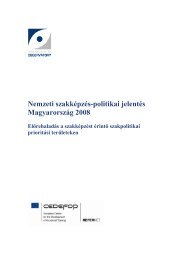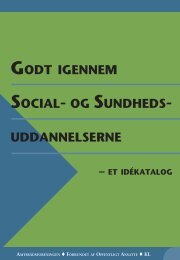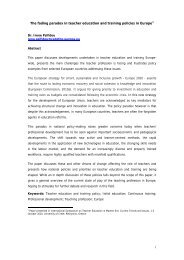PROFF – Professionalisation of VET teachers for the future - Europa
PROFF – Professionalisation of VET teachers for the future - Europa
PROFF – Professionalisation of VET teachers for the future - Europa
You also want an ePaper? Increase the reach of your titles
YUMPU automatically turns print PDFs into web optimized ePapers that Google loves.
namely three Finnish (Telkkä, TOKE and Tukeva), one Norwegian (‘vocational pedagogy inenterprises’) and one Italian (HEP).Training programmes address <strong>the</strong> new challenges and competences <strong>for</strong> <strong>teachers</strong> and managersto operate in <strong>the</strong> changed setting. They need to be able to plan and carry out on-<strong>the</strong>-joblearning and skills demonstrations as well as <strong>the</strong>oretical and practical knowledge and skills inassessment, evaluation and quality control. They also need to be familiar with legislation and<strong>the</strong> ideology <strong>of</strong> on-<strong>the</strong>-job learning and skill demonstrations as well as pedagogy and teachingmethods.Teachers need knowledge <strong>of</strong> <strong>the</strong> practices in businesses and workplaces to respond better to<strong>the</strong> needs <strong>of</strong> working life. In <strong>the</strong> programmes analysed, network-based cultures have beenadopted including intensified networking with <strong>the</strong> world <strong>of</strong> work, businesses and <strong>the</strong>ir staff aswell as developing institutional partnerships. Networking also enabled <strong>teachers</strong> in <strong>the</strong> Finnishprogrammes to assess on-<strong>the</strong>-job learning places, important in quality control <strong>of</strong> <strong>VET</strong>.As generally agreed, functional cooperation between schools and <strong>the</strong> world <strong>of</strong> work canimprove <strong>the</strong> quality <strong>of</strong> education and its relevance to working life. It also assists youth in <strong>the</strong>irtransition to working life. It is productive to establish and maintain <strong>the</strong>se relationships atteacher-manager level instead <strong>of</strong> <strong>the</strong> traditional top management level. This bottom-acrossapproach could ensure continuation and continuing exchange between schools and enterprises.3.4.6. Increasing pr<strong>of</strong>essional wellbeingAs mentioned earlier, an important goal <strong>for</strong> teacher and trainer training is to make <strong>VET</strong>teaching more attractive <strong>for</strong> <strong>teachers</strong> and trainers. This is a challenge <strong>for</strong> national authorities,labour unions and education providers, particularly at a time when workload and challenges<strong>for</strong> <strong>the</strong> pr<strong>of</strong>ession are constantly increasing. In addition, countries such as <strong>the</strong> Czech Republic,Finland, Germany, Italy, Norway and Sweden are facing an ageing teacher population. Arecent study estimated that 42 % <strong>of</strong> <strong>VET</strong> <strong>teachers</strong> in Finland are 50 years or older(Opetusministeriö, 2003). If national <strong>VET</strong> systems are to be effective we need <strong>teachers</strong> to stayon longer and we need to attract new entrants into <strong>the</strong> pr<strong>of</strong>ession.This raises <strong>the</strong> important <strong>–</strong> but <strong>of</strong>ten neglected <strong>–</strong> question <strong>of</strong> <strong>the</strong> ‘pr<strong>of</strong>essional wellbeing’ <strong>of</strong><strong>VET</strong> personnel.What is pr<strong>of</strong>essional wellbeing? A teacher in a Finnish project defined it as ‘<strong>the</strong> ease andlightness <strong>of</strong> coming to work every morning’. Pr<strong>of</strong>essional wellbeing is essential not only <strong>for</strong>staff retention but also <strong>for</strong> <strong>the</strong> quality <strong>of</strong> training national <strong>VET</strong> systems provide to learners. AsJohn Coolahan (2002) put it:‘It is only intelligent, highly skilled, imaginative, caring and well educated<strong>teachers</strong> who will be able to respond satisfactorily to <strong>the</strong> demands placed on <strong>the</strong>education in developed societies. If society’s concern is to improve quality in25



